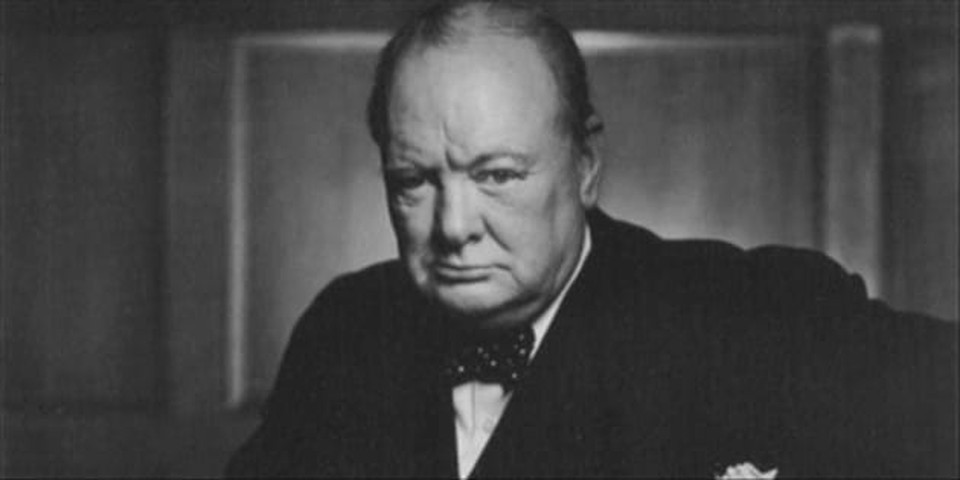Churchill's 5 Leadership Lessons for Pastors

Americans love British leaders. Even as his popularity declined after the Iraq invasion, Tony Blair remained many Americans' preferred leader in the "special relationship." We cast one of our most acclaimed actresses, Meryl Streep, to play the Iron Lady, Margaret Thatcher. We're still celebrating the legacy of John Stott, remembered strangely by Americans as above the controversies that divide evangelicals stateside.
Maybe it's the accent that we associate with profundity. Maybe it's the dry wit we pretend to think is humorous. Or maybe it's the history that shames our boasts of universities founded as long ago as 1636. Try AD 1096, Oxford dons retort between puffs from their pipe. Maybe only Jesus and Paul are quoted more frequently by evangelical pastors that that don turned patron saint, C. S. Lewis.
- If pastors love Lewis above all other Brits, then Winston Churchill comes in a close second. Chances are the ministers you know have read a Churchill biography or two. And why not? Ministry feels a lot like war sometimes, and Churchill played a major role in the two biggest conflicts this world has ever seen. If the pulpit sometimes feels like a vulnerable place to stand, at least the congregation doesn't boo and hiss as they pepper you with questions, as MPs do in Parliament. Criticism can be harsh in a church, but it doesn't hold a candle to bearing the wrath of a nation watching its sons, husbands, and fathers die helplessly and pointlessly on the beaches of Gallipoli.
Pastors can identify with the ups and downs of Churchill's career. His quips inspire them. And his triumphs and tragedies can even teach us a thing or two (or five) about leadership. I've deduced these lessons primarily by reading Max Hastings's book Winston's War: Churchill 1940-1945.
(1) Your rhetoric matters.
The British army never stood a chance of matching the Germans. Without help from the Soviets or Americans, Britain was likely to fall to the Nazi juggernaut, as did the the European continent. So Churchill took to the floor of Parliament and the radio airwaves to do what he could: rouse the British people to meet their moment. One day following France's surrender, Churchill told the House of Commons, "Let us therefore brace ourselves to our duties, and so bear ourselves that if the British Empire and its Commonwealth last for a thousand years, men will still say, 'This was their finest hour.'"
It was. The Royal Air Force fended off German bombers ahead of an expected invasion. The shell-shocked public would not bow to German aggression. Probably no one but Churchill could have roused them to make this stand. Armed with little more than eloquence and the British Channel, Churchill led Britain through their darkest hour.
We live in a show-me age that values deeds over creeds, actions over words. But public speaking remains a powerful tool in the pastor's kit. Good thing, too, because God's Word gives pastors this command: "preach the word; be ready in season and out of season; reprove, rebuke, and exhort, with complete patience and teaching" (1 Timothy 1:2). If Churchill could inspire a nation with words, how much more can we do when armed with the only divinely inspired Word?
(2) You will make mistakes---lots of them.
Popular memory tends to forget the victors' foibles. Churchill's errors in judgment might have prolonged the Second World War for several years if he hadn't been overruled by American generals. Churchill, whose armies had been embarrassed by the Germans in nearly every battle, feared a bloodbath on the beaches of northwest France. He backed the Italian campaign and pleaded for an Adriatic invasion. This was foolishness, and his allies knew it. For the war to end, they had to storm Normandy.
Churchill got the one big question right: Britain could not negotiate with the madman Hitler, so they must mobilize for another all-out war with Germany. But he exasperated his aides, generals, and American allies with ill-conceived plots celebrating pointless heroism over bloody necessity.
Congregations somehow expect of their pastors something they would never expect of themselves: perfection. Yet other than Jesus, we find no perfect leader in the Bible. Nathan rebukes David. Paul rebukes Peter. Romans 7 applies to us all. We sin, and we make poor strategic decisions. The fog of war clouds our thinking. Proverbs 15:22 tells us, "Without counsel plans fail, but with many advisers they succeed." That's good, inspired counsel, but like many other proverbs, it's not a guarantee in all circumstances. We should cut each other some slack. When you expect to sometimes err, you'll be better prepared to adapt, as you must.
(3) Your personal touch builds much-needed credibility.
Churchill is hardly a character model. His parenting left much to be desired. Many subordinates and rivals despised him. Their journals, filled with invective, tell this sad story. They lamented his flights of strategic fancy. They resented him for keeping them up all hours so he could pontificate about one matter or another. They counted him many times a political goner when news of another British defeat returned from the battlefields.
And yet many intimates loved him so much they would put up with anything to support him in an impossible task of leading their country in war. His wit buoyed their spirits in times of deprivation and sacrifice. His considerate charm covered a multitude of sins.
The Bible makes much of character as the qualifying factors for pastoral ministry (1 Timothy 3; Titus 1:5-9). Even though Churchill would not have made a good pastor, we can see from his life how a little considerate care for fellow church leaders and the rest of the congregation can go a long way. This love and trust, preserved by the Holy Spirit, sustains us during internal conflict and external challenges.
(4) You lead by persuasion, not dictate.
The Americans and British fought at a severe disadvantage compared to their German and Japanese enemies, and even their Russian allies. The Western allies didn't want to die. Officers ruled these other combatants with an iron fist during incomprehensible hardship. Retreat equaled death, so you might as well stay and fight. The United States and Great Britain would not fight on these gruesome terms. Axis officers marveled at how easily their soldiers surrendered, compared to the Russians.
Throughout the war, even when Britain faced national extinction, Churchill endured opposition from other MPs, his fellow ministers, and the public. Thousands of workers shut down factories providing vital goods as they negotiated higher wages. Even as the most powerful prime minister in Britain's history, Churchill led only partially by direct order. Winning the war demanded skills of persuasion to keep the public working, keep the armed forces fighting, and keep other MPs from negotiating with Hitler.
Ministry will at times require pastors to exercise their God-given authority, as in cases of church discipline. But most leadership will be exercised by persuading Christians to do what they might not initially want or believe they can do. Consider Paul: invoking his apostolic commission hardly thwarted opposition in places like Corinth and Galatia. Instead he sought to persuade them by the strength of his exegesis (Gal. 3) and his example as a humble follower of Christ (1 Corinthians 11:1).
(5) You may be the last one to know when your time has passed.
Churchill saw the war through to victory. But he was so focused on the task at hand that he hardly discerned his nation's eagerness for change. A little more than two months after Germany surrendered, Britain voted his party our of power and deposed him as PM.
Churchill was exactly the right man to lead Britain in war, but he was ill-prepared to lead his country in the immediate aftermath. Committed to a vision of Britain's imperial greatness, he could not scale back the empire and implement the social and economic changes his people demanded. One day Britain's global war effort depended on his constant attention to endless details. Following the election his world fell silent. History had no more use for him. (We should note, however, that Churchill led the opposition for many years following the war and even returned unexpectedly to serve another tenure as prime minister. Old age does not disqualify leaders, including pastors.)
No pastor has been gifted by God in every way. One pastor strong in discipleship struggles to preach. Another who enjoys counseling loathes administration. Since congregations tend to take on the shape of their pastor, they will be strong in some areas and attract new members accordingly. But they may be weak in other ways where a new pastor could guide the congregation more effectively.
It's a sign of weak leadership when a church falls apart after the pastor leaves or retires. None of us is that important. Britain survived without Churchill, and the kingdom of God will thrive on earth even when we've joined the heavenly chorus. Good leaders can say with Paul, "My desire is to depart and be with Christ, for that is far better (Philippians 1:23). Still, they might conclude, "But to remain in the flesh is more necessary on your account" (Philippians 1:24). Either way, this eternal perspective arms pastors with perspective to properly evaluate their leadership. Trust in God is the foundation for determining when it is time to stay and time to go, lest others need to make that decision for you.
Collin Hansen serves as editorial director for The Gospel Coalition. He is the co-author of A God-Sized Vision: Revival Stories that Stretch and Stir. You can follow him on Twitter.

Originally published December 16, 2011.





